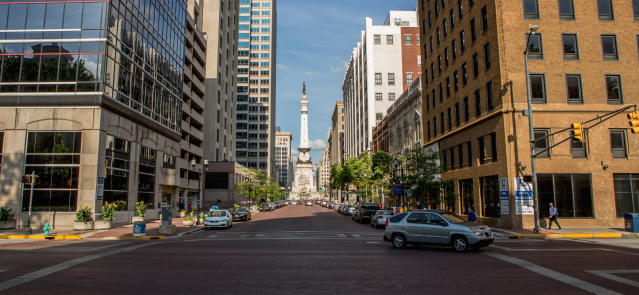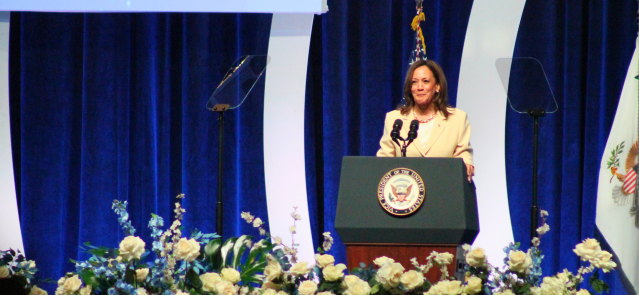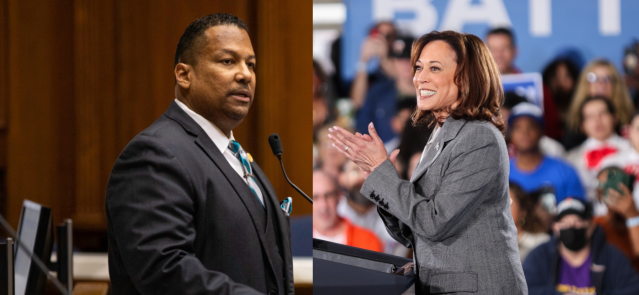Stay ahead of the curve as a political insider with deep policy analysis, daily briefings and policy-shaping tools.
Request a DemoFree tickets and fancy meals: How lobbyists spent $1M entertaining lawmakers during session
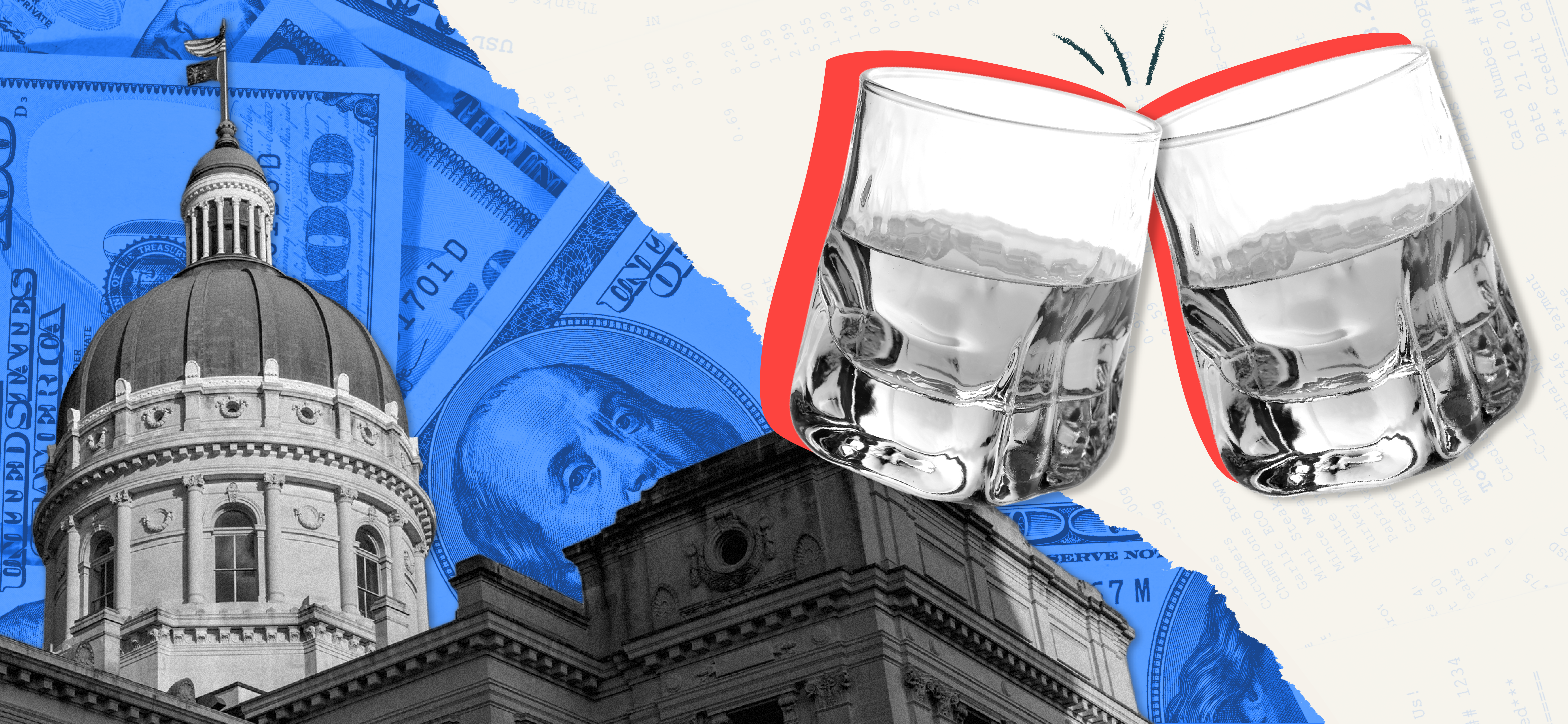
(Design: Anna French)
- State Affairs examined hundreds of reports filed with the Indiana Lobbying Registration Commission as part of an exclusive investigation breaking down lobbyist spending.
- Preliminary reports show that roughly three-fourths of the more than $1 million spent will remain secret from the public due to gaps in state law.
- Suite tickets. College championships. Hundreds on food and beverages. Lawmakers accepted at least $33,000 tied to professional and college sports.

Senate President Pro Tempore Rodric Bray received nearly $1,700 worth of Indiana Pacers tickets for his family from a major lobbying firm representing dozens of groups and companies.
Another firm spent more than $5,300 on a combination of meals and dinner cruises for 20 lawmakers and some of their spouses while they were in Hawaii for a legislative conference.
And Sen. Eric Koch’s wife accompanied him to nine lobbyist-paid meals over the course of six months, including two that were more than $200 a piece.
Those are just some of the ways that lobbyists spent more than $1 million in entertainment and gifts on Indiana lawmakers, their families and staff at a time when legislators were deciding how to allocate billions of taxpayer dollars in the state budget this year.
To learn how lobbyists sought to influence Indiana lawmakers, State Affairs examined hundreds of reports filed with the Indiana Lobby Registration Commission that detail gifts and entertainment spending from Nov. 1, 2022, through April 30, 2023 — the six-month period covering the most recent legislative session. Those expenses, which are self-reported by lobbyists, were due to the commission May 31, though it’s likely lobbyists are still amending some reports. The information is not compiled into a single document, so State Affairs created a 1,700-row spreadsheet, removing any likely duplicates.
The spending frames a portrait of how Indiana lawmakers are treated to meals costing hundreds of dollars as a matter of routine — on top of the thousands of dollars in other freebies they received from legislative lobbyists hoping to influence their vote or seek their support for issues of importance to big business, nonprofits and others.
An investigation by State Affairs found:
- The top recipient of publicly disclosed lobbyist spending is Rep. Bob Morris, a Fort Wayne Republican who chaired a committee that heard a total of three bills across four months.
- At least $33,000 benefited 55 lawmakers in the form of tickets, food and beverages to professional and college sporting events, including the Pacers, Indianapolis Colts and Indiana University basketball.
- Republicans on average received almost twice as much as Democrats, which is likely a reflection of the supermajority’s power and appeal to lobbyists.
- Only eight out of 150 lawmakers did not appear to benefit from lobbyist spending on gifts or entertainment.
- Lobbyists are not always required to disclose which lawmakers benefited. In fact, preliminary reports show that gaps in state law will result in roughly three-fourths of the more than $1 million remaining secret from the public.
That level of spending on entertainment and gifts can lead to cloudy judgment, said Julia Vaughn, executive director of government accountability group Common Cause Indiana — and it sends the wrong message to constituents.
“It sends the message that wining and dining is a natural part of the legislative process,” Vaughn said. “It\’s really the buying of goodwill, and that just shouldn\’t be part of it.”
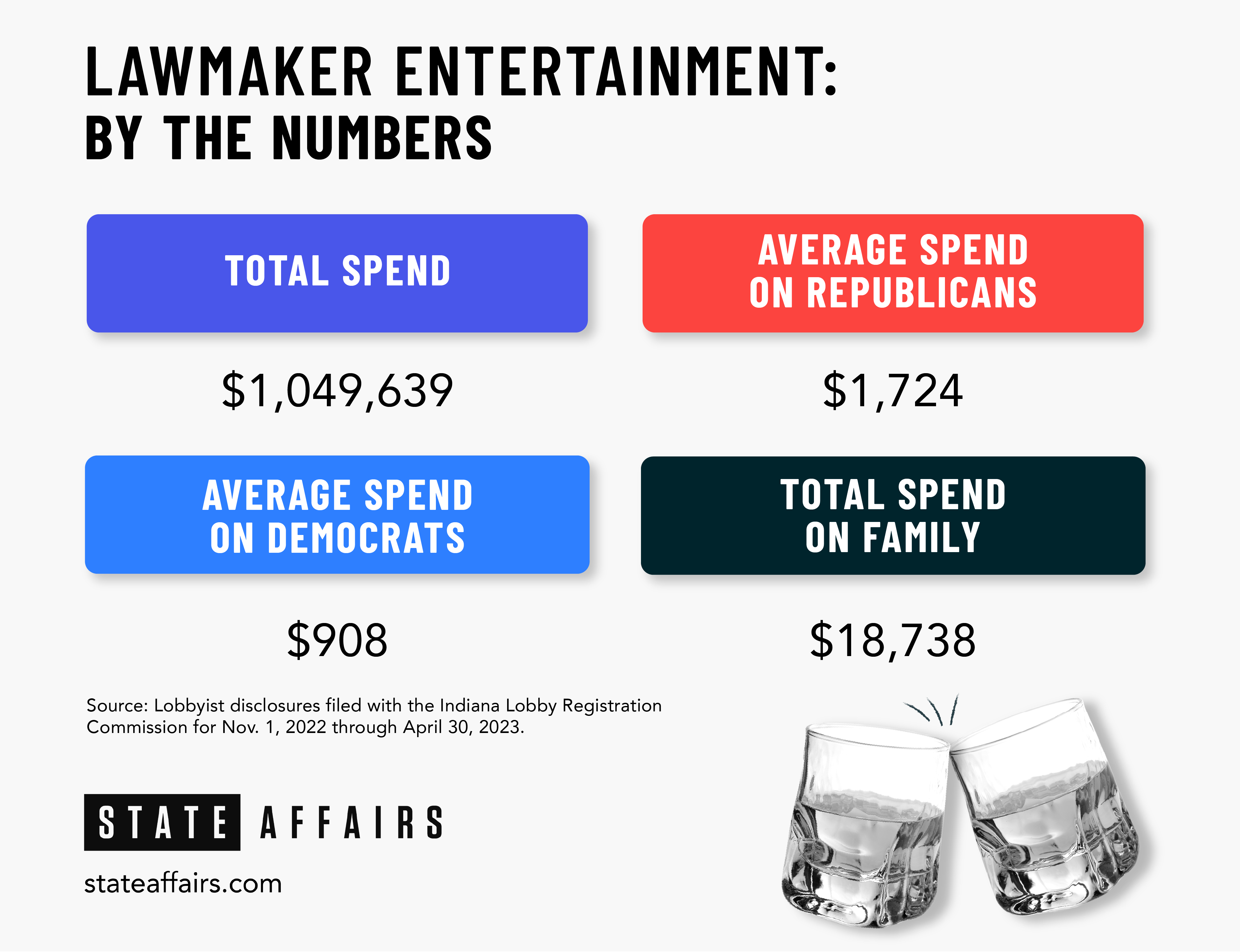
Some lawmakers and lobbyists say such expenses have a place in the legislative process, as long as it’s transparent. Bray, a Martinsville Republican who leads the chamber, declined an interview request from State Affairs but released a statement through a spokeswoman.
“Business conversations happen in a variety of ways. We value transparency, which is why gifts from lobbyists are reported. There is a legitimate need to meet with industry experts to make better-informed public policy decisions,” Bray said in the statement. “Senate Rule 91 makes clear we expect our senators to consider whether accepting a gift will unduly influence their independent legislative judgment, and I trust our members to act responsibly in this space.”
Part of the consideration, according to the ethics rule, is whether the person is offering freebies to the senator “with the intent to influence the senator\’s conduct in the performance of legislative duties.” If so, senators are supposed to decline.
Lawmakers, though, are not required by state law to disclose what they receive from lobbyists. That responsibility falls to the lobbyists themselves — and every dollar is self-reported to a state commission that employs three people. The vast majority of reports are not audited. Even then, most of the money spent on entertainment and gifts is untraceable to specific lawmakers.
That leaves Hoosiers in the dark.
Which lawmaker received the most from lobbyists?
The person who appeared to benefit most handsomely from lobbyists is Bob Morris, a Republican from Fort Wayne.
All told, Morris and his family received at least $6,700 in gifts and entertainment during the six-month period, according to lobbyist disclosures. He collected 20% more than the second-highest lawmaker, and he totaled more than the lowest 35 lawmakers combined.
Morris chairs the House Commerce, Small Business and Economic Development committee. His committee heard three bills over four months — less than 1% of the total bills filed this year.
Morris did not respond to three requests for an interview. Erin Wittern, a spokeswoman for House Republicans, issued a statement on behalf of the caucus.
“We have strong rules and laws on the books concerning lobbying expenditures,” she said, “and we remain committed to transparency and placing the interests of Hoosiers first.”

Much of the lobbyist spending on Morris is tied to pricey meals, which is common for Indiana lawmakers. For Morris, State Affairs could trace at least 10 meals for he and his wife that exceeded $100 per meal, including one during the week of Sine Die paid for by a Barnes and Thornburg lobbyist that cost $378.05.
About a third of the lobbyist spending on Morris was for college and professional sports. The day after his $378.05 dinner, for example, Morris received tickets and food for the Fort Wayne Komets hockey team valued at $352.42, according to lobbyist disclosures. Those were paid by Five Star Distributing, a beer distributor operating in Morris’ district.
Then five days after that — in the weekend following the end of the legislative session — Morris accepted $100 in tickets from Five Star Distributing to see the Fort Wayne TinCaps, a minor league affiliate of the San Diego Padres.
He also accepted a gift valued at $350 from Live Nation Entertainment for the Big Ten football championship game at Lucas Oil Stadium last December. The next month, Morris saw the Indiana Pacers on the dime of RSM, a company that provides financial and consulting services.
Pacers, Colts and other entertainment
Morris wasn’t the only lawmaker to accept freebies tied to professional and college sports.
Suite access for the Colts and Pacers. Tickets to watch Indiana University Hoosiers basketball. Food and beverages valued at hundreds of dollars.
State Affairs found 55 lawmakers benefited in sports spending totaling at least $33,000 — an amount on par with a median Hoosier’s income for the year.
Bray, the Senate head, received the highest amount of disclosed sports-related entertainment. Lobbyists paid $3,398 for Bray and his family to enjoy sporting events, including about $1,500 from the Indiana Chamber of Commerce to watch the Pacers. He attended Pacers games on lobbyists’ dimes two additional times.
Altogether, Bray ranked No. 10, receiving $4,100 worth of entertainment and gifts when also including meals.

His counterpart in the other chamber, House Speaker Todd Huston, received the third-highest amount of sports freebies — including $1,000 paid by Zink Distributing Company, a beer distributor, for a “Football Game.” He did not accept very many meals, though, which means he ranked No. 43 on the list, totaling $1,994 in gifts and entertainment.
One lawmaker initially identified by State Affairs as the top free sports recipient, however, said there was a mistake in the lobbyist disclosures.
Norton Healthcare reported spending more than $4,000 for Sen. Chris Garten, R-Charlestown, his wife and their three kids to attend a Chicago Bulls game on March 29.
When asked last week by State Affairs about that outing, a spokeswoman for Garten said it was agreed beforehand that the senator would be invoiced for the tickets so he could pay for them.
“He’s taking steps to complete that process,” said Molly Fishell, a spokeswoman for Senate Republicans.
Other top lawmakers given entertainment and gifts from lobbyists
Other lawmakers didn’t necessarily top the list because of an outsized number of sporting tickets, but they did have something else in common. All five of the top recipients are Republican men.
Plus, four out of five of the lawmakers who benefited the most from lobbyists are committee chairs, among the most powerful lawmakers in the Statehouse because they decide whether a bill can be voted on or even debated. Committee chairs on average received $464 more than those who don’t lead committees.
Aside from Morris, here’s who else topped the list, none of whom responded to a request for an interview:
2. Rep. Brad Barrett, R-Richmond: As chair of the House Public Health committee, the majority of Barrett’s meals and entertainment came from lobbyists with ties to the health care industry. Both caucuses made addressing health outcomes a priority this legislative session, whether it was to reduce costs to the consumer or increase public and mental health spending, so Barrett was a sought-after lawmaker. Altogether he and his wife received $5,494 worth of meals, entertainment and sports tickets during the six-month period.
In the middle of the legislative session, a health care-focused lobbyist from The Corydon Group paid for Barrett and six other lawmakers to golf at Arizona’s Quintero Golf Club, as well as a more than $200 meal for Barrett at an Arizona steakhouse that same day. The lobbying firm represents Parkview Hospital as well as multiple pharmaceutical companies. Barrett would spend the remainder of session shepherding multiple bills on the House side impacting the health care industry.

Chris Gibson, managing principal for The Corydon Group, said the firm “goes to significant lengths” to follow the law and be transparent. The firm routinely specifies where a meal was purchased, for example, as well as the date, while many other lobbyists do not.
“In a part-time legislature, our public affairs professionals are trusted by policy makers to help educate them on issues impacting our clients,” Gibson said in a statement. “From time to time, this includes interacting with legislators at conferences and events that take place outside of Indiana.”
3. Rep. Doug Miller, R-Elkhart: Miller benefited from the generosity of a mix of groups, including the Association of Indiana Prosecuting Attorneys, health care entities and utility groups. Of the $5,341 Miller received, his largest line items came from those associated with the home building and apartment industry. He received meals at Prime 47 and Salt on Mass from the Indiana Apartment Association.
While Miller chairs the House Government and Regulatory Reform committee, perhaps what he was most known for this session was his work on House Bill 1005. That Republican priority bill aimed to make Indiana’s housing supply more affordable, but the final version left apartment costs out of the equation. Miller also is on the House Environmental Affairs committee.
4. Rep. Bob Heaton, R-Terre Haute: Unlike the others on the top five list, Heaton does not chair a committee. He was among those who benefited from entertainment on two out-of-state trips, paid for in part by The Corydon Group. The first was the Arizona trip Barrett also attended. The other occurred on a trip to Hawaii for a legislative conference, enabled by a taxpayer-paid legislative fund dedicated to professional development. While there, lobbyists spent at least $364 on entertainment and meals, including a USS Missouri ticket and a dinner cruise for Heaton and his wife. Lobbyists are prohibited from paying for flights or hotels for out-of-state trips, but can still pay for meals.
5. Sen. Eric Koch, R-Bedford: It was a busy session for Koch. He carried priority legislation from Senate Republicans seeking to limit the right to bail, and he continued to shepherd complicated bills as the chair of the powerful Senate Utilities Committee. He received at least $4,989 in gifts and entertainment — including more than $3,000 from lobbyists and companies connected to the electric utility, transmission and telecommunications industries. About a fifth of the overall spending on Koch was directed toward his wife, who received at least $1,048 in spending from lobbyists — the most that lobbyists spent on a lawmaker’s family member during the six-month period.
Altogether, lobbyists spent at least $18,738 on all lawmakers’ family members.
Some lawmakers (quietly) decline gifts and entertainment
Out of the 150 lawmakers across both chambers, only eight did not appear to receive a gift or any entertainment paid for by lobbyists:
- Republicans: Rep. Bruce Borders; Rep. Ryan Lauer; Rep. Elizabeth Rowray; Sen. Jim Tomes
- Democrats: Rep. Ryan Dvorak; Rep. Sheila Klinker; Sen. Fady Qaddoura; Rep. Vanessa Summers
State law does not always require lobbyists to name lawmakers who received gifts and entertainment — such as if every lawmaker is invited to an event, for example, or the spending does not exceed $50 per day or $250 per year. It is possible that some still received gifts that did not meet the threshold.
But three contacted by State Affairs said they don’t accept most if not all entertainment.
“I always want to have a soft heart, one that the Lord can ply and mold and so forth, and so I’m really cautious about undue influence,” Borders, R-Jasonville, told State Affairs.
Borders will occasionally attend lobbyist dinners held for committees he is on, but he joked it was “rarer than a Bigfoot sighting” for him to eat with a lobbyist. That meant he once declined an opportunity to purchase Colts’ Super Bowl tickets at face value, which frustrated his son at the time.
For Qaddoura, D-Indianapolis, he pledged prior to his time as a state senator — back when he worked for the state government and then for Indianapolis as the city controller — against personally benefiting from his public office.
“Sometimes we lose trust as public servants if people think that they sent us here to work for them and all you\’re doing is dining and wining and enjoying yourself. I always ask myself: If I\’m going to accept this meal, why not my constituents?” Qaddoura said. “Why should it be that a legislator gets to go eat at the fanciest restaurants in our communities when our own constituents can\’t afford these meals?”

It’s been an evolution for Dvorak, D-South Bend. He told State Affairs that he would accept lobbyist spending years ago, including free tickets to watch a Sweet 16 basketball game in Indianapolis. But he said he decided to create a “bright line” for himself several years ago because he wanted to avoid even the appearance of impropriety as a member of the General Assembly.
“There\’s lobbyists for all sorts of things, but now it\’s only the lobbyists with money who have real access,” Dvorak said. “Lobbying in this environment is less about determining the factual veracity of an issue and hinges more on which moneyed interest has more access to influence how an issue is legislated or regulated.”
He noted that the names of some lawmakers, though, will likely appear in lobbyist spending simply because they attended an industry luncheon open to a lot of others, too. Those types of meals aren’t necessarily what comes to mind for the public as nefarious, he said.
The lobbyists who do spend money on entertainment see it as a necessary way to build relationships and help their clients.
Michael O’Brien, a lobbyist at 1816 LLC, said lobbyists are just like salespeople attempting to sell lawmakers policies that will prevent their clients from being harmed. Some lawmakers want to meet at restaurants, while others want to keep it strictly in-building. His lobbying firm only reported purchasing one set of sports tickets for a lawmaker during the most recent reporting period.
“In order to lobby effectively you’ve got to have the trust of the person you’re talking to,” O’Brien said. “You only get that by building relationships over time and you really get that quality relationship by spending time with them so they understand where you’re coming from.”
Women and Democrats accept less entertainment
Women and Democrats — both in the minority in the Statehouse — received fewer entertainment dollars on average.
Women make up roughly a quarter of Indiana lawmakers, but only 15% of the recorded spending from lobbyists. On average, female lawmakers and their families received $830, while male lawmakers on average received more than double at $1,753.
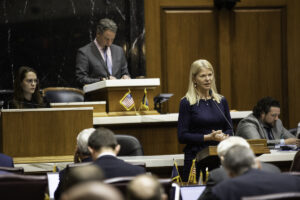
At the top among women is Rep. Sharon Negele, R-Attica. Negele, who is 32nd on the list, received at least $2,451 in gifts and entertainment, according to lobbyist disclosures, largely in meals. One of her largest expenses, though, was nearly $400 for “sporting event ticket & refreshments” from the Indiana Energy Association, which lobbies on behalf of natural gas and investor-owned electric utility companies. Negele declined a State Affairs request for an interview.
It’s a similar story among Democrats. The average Democrat received $908 in gifts and entertainment, while the average Republican received $1,724.
Rep. Kyle Miller, a freshman from Fort Wayne, received the most among Democrats, falling at 22nd on the list. Miller, who received at least $3,000 in gifts and entertainment, declined an interview request.
“Rep. Miller’s top priority continues to be ensuring his constituents have a voice in the Indiana Statehouse,” Hannah Smith, a spokeswoman for House Democrats, said in a statement. “As a new member of the General Assembly, part of getting acclimated to the Statehouse and the responsibilities of an elected official requires you to meet with various stakeholders to understand their viewpoints and legislative concerns.”

Aside from at least one meal dedicated to freshmen lawmakers, he also benefited from two Fort Wayne-centric lobbyist dinners. His priciest expense was a $270 legislative dinner that a third of Indiana lawmakers attended.
Further proof that Democrats’ positions are by and large less lucrative, Senate Minority Leader Greg Taylor, D-Indianapolis, received the least amount of gifts and entertainment among the four legislative leaders. He was 47th on the list overall with $1,849. It’s unclear what the biggest expense — $414.31 — paid for. Bose Public Affairs Group simply wrote: “Exceeded Annual Threshold.” Taylor declined a State Affairs interview request.
House Minority Leader Phil GiaQuinta, D-Fort Wayne, however, received more than his Republican counterpart, Huston. GiaQuinta was ranked No. 36, receiving $2,294 in gifts and entertainment. He attended 18 lobbyist-paid meals, the priciest of which was a $270 dinner a third of state lawmakers attended. GiaQuinta declined an interview request through a spokeswoman.
While Democrats received fewer gifts and entertainment overall — which may be a reflection of their limited power in the General Assembly as much as anything else — they still accepted $4,247 in sports freebies and 10 of them enjoyed at least one free lobbyist-paid meal while in Hawaii for a legislative conference.
Could Indiana’s lobbying laws be stronger?
In Vaughn’s eyes, lobbying to this magnitude complicates Indiana’s legislative process.
“It takes away from the issues and introduces relationships into the equation,” Vaughn said. “The person you went and had a great time with at the ball game, you’re going to call them back first.”
Other states have more stringent lobbying and disclosure laws. In Georgia, for example, providing lawmakers with free sports tickets is prohibited, as is food and beverages above $75 that are not produced in Georgia. That would mean a chunk of the meals that Indiana lawmakers received while in Hawaii would be off the table.
In Wisconsin, lobbyists are generally prohibited from giving anything of value to an elected official or legislative employee, though they can make a personal contribution to a lawmaker’s campaign at certain times of the year.
In Indiana, though, such contributions are allowed. Plus, Indiana’s lobbying disclosure laws have other loopholes and shortcomings.
Just as one example, Indiana law requires disclosure only twice a year. That\’s why the public would never learn about a Hawaiian dinner cruise in December paid for by lobbyists until the end of May — several weeks after the legislative session is over.
But, the very people who benefit from the lobbyists\’ gifts — and who would be put under a microscope with more transparency — are the ones who would have to vote to change the system.
Contact Kaitlin Lange on Twitter @kaitlin_lange or email her at [email protected].
Contact Ryan Martin on Twitter, Facebook, Instagram, LinkedIn, or at [email protected].
Twitter @StateAffairsIN
Facebook @stateaffairsin
Instagram @stateaffairsin
LinkedIn @stateaffairs
Header image: Lobbyists spent more than $1 million on gifts and entertainment for lawmakers over a six-month period. (Credit: Anna French)
4 things to know about Braun’s property tax proposal
Sen. Mike Braun, the Republican candidate for Indiana’s governor, released a plan for overhauling property taxes Friday morning that would impact millions of Hoosiers, Indiana schools and local governments. “Nothing is more important than ensuring Hoosiers can afford to live in their homes without being overburdened by rising property taxes driven by rapid inflation in …
Bureau of Motor Vehicles looks to add new rules to Indiana’s driving test
The Bureau of Motor Vehicles wants to amend Indiana’s driving skills test, putting “existing practice” into administrative rule. Indiana already fails drivers who speed, disobey traffic signals and don’t wear a seatbelt, among other violations. Yet the BMV is looking to make the state’s driving skills test more stringent. A proposed rule amendment looks to …
In Indianapolis, Harris says she’s fighting for America’s future
Vice President Kamala Harris, the presumptive Democratic presidential nominee, told a gathering of women of color in Indianapolis on Wednesday that she is fighting for America’s future. She contrasted her vision with another — one she said is “focused on the past.” “Across our nation, we are witnessing a full-on assault on hard-fought, hard-won freedoms …
Indiana Black Legislative Caucus endorses Harris, pledges future support
The Indiana Black Legislative Caucus unanimously voted Wednesday to endorse Vice President Kamala Harris’ presidential run and will look at ways to assist her candidacy, the caucus chair, state Rep. Earl Harris Jr., D-East Chicago, told State Affairs. The caucus is made up of 14 members of the Indiana General Assembly, all of whom are …

